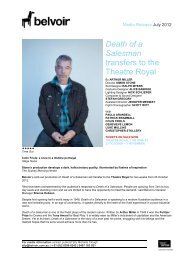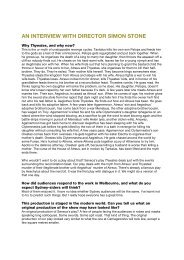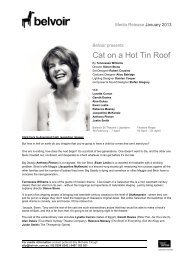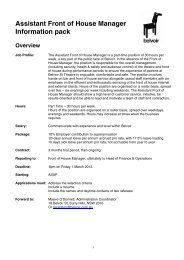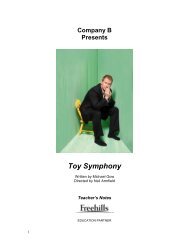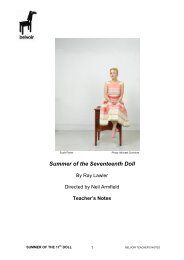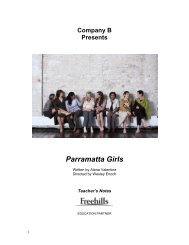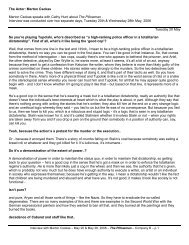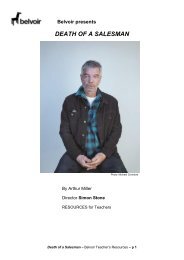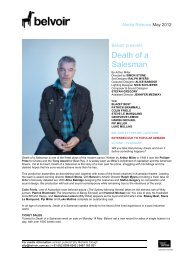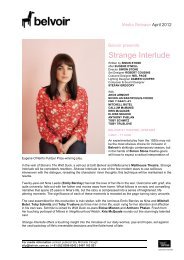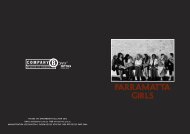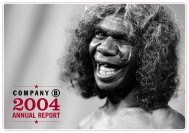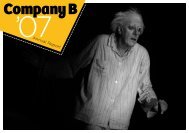The Seed – Teachers Notes - Belvoir St Theatre
The Seed – Teachers Notes - Belvoir St Theatre
The Seed – Teachers Notes - Belvoir St Theatre
Create successful ePaper yourself
Turn your PDF publications into a flip-book with our unique Google optimized e-Paper software.
Company B<br />
Presents<br />
Photograph: Alex Craig<br />
<strong>The</strong> <strong>Seed</strong><br />
Written by Kate Mulvany<br />
Directed by Iain Sinclair<br />
Companion Director Neil Armfield<br />
Teacher’s <strong>Notes</strong><br />
EDUCATION PARTNER
Company B<br />
Company B sprang into being out of the unique action taken to save the Nimrod <strong>The</strong>atre<br />
building from demolition in 1984. Rather than lose a performance space in inner city<br />
Sydney, more than 600 arts, entertainment and media professionals as well as ardent<br />
theatre lovers, formed a syndicate to buy the building. <strong>The</strong> syndicate included nearly<br />
every successful person in Australian show business.<br />
Company B is one of Australia’s most celebrated theatre companies. Under the artistic<br />
leadership of Neil Armfield, the company performs at its home at <strong>Belvoir</strong> <strong>St</strong> <strong>The</strong>atre in<br />
Surry Hills, Sydney and from there tours to major arts centres and festivals both<br />
nationally and internationally. Company B engages Australia’s most prominent and<br />
promising playwrights, directors, actors and designers to present an annual artistic<br />
program that is razor-sharp, popular and challenging.<br />
<strong>Belvoir</strong> <strong>St</strong> <strong>The</strong>atre’s greatly loved Upstairs and Downstairs stages have been the artistic<br />
watering holes of many of Australia’s great performing artists such as Geoffrey Rush,<br />
Cate Blanchett, Jacqueline McKenzie, Noah Taylor, Richard Roxburgh, Max Cullen, Bille<br />
Brown, David Wenham, Deborah Mailman and Catherine McClements.<br />
Sellout productions like Cloudstreet, <strong>The</strong> Judas Kiss, <strong>The</strong> Alchemist, Hamlet, <strong>The</strong> Small<br />
Poppies, Waiting for Godot, <strong>The</strong> Underpants, Gulpilil, <strong>The</strong> Sapphires and <strong>St</strong>uff Happens<br />
have consolidated Company B’s position as one of Australia’s most innovative and<br />
acclaimed theatre companies. Company B also supports outstanding independent<br />
theatre companies through its annual B Sharp season.<br />
<strong>Belvoir</strong> <strong>St</strong> <strong>The</strong>atre has recently undergone a major renovation to provide Company B<br />
with a state of the art home for the future whilst retaining the charm of the original<br />
building.<br />
For more information visit www.belvoir.com.au
Company B<br />
Presents<br />
<strong>The</strong> <strong>Seed</strong><br />
Written By Kate Mulvany<br />
Directed by Iain Sinclair<br />
Companion Director Neil Armfield<br />
With<br />
DANNY ADCOCK Danny Maloney<br />
KATE MULVANY Rose Maloney<br />
MARTIN VAUGHAN Brian Maloney<br />
MICKA AGOSTA Set and Costume Designer<br />
MATT COX Lighting Designer<br />
STEVE TOULMIN Composer and Sound Designer<br />
KYLIE MASCORD <strong>St</strong>age Manager<br />
NELL RANNEY Assistant <strong>St</strong>age Manager<br />
Companion Artists<br />
DALE FERGUSON Set and Costumes<br />
DAMIEN COOPER Lighting<br />
SOUND Paul Charlier<br />
<strong>The</strong> Company B production of <strong>The</strong> <strong>Seed</strong> opened at <strong>Belvoir</strong> <strong>St</strong> <strong>The</strong>atre<br />
on 20 February 2008.<br />
<strong>The</strong> original B Sharp production of <strong>The</strong> <strong>Seed</strong> premiered at <strong>Belvoir</strong> <strong>St</strong> Downstairs<br />
<strong>The</strong>atre on 20 July 2007, produced by Sam Hawker
Setting the Scene<br />
<strong>The</strong> <strong>Seed</strong> is set in a council flat in Nottingham, England on the 5 th November<br />
sometime during the 1990s.<br />
Three generations of the same family have come together to celebrate their<br />
collectives birthday. It’s Brian Maloney’s 80 th birthday and today his son, Danny<br />
Maloney, (also born on 5 th November) and his granddaughter Rose Maloney<br />
(who turns 30 on the 5 th November) have travelled from Geraldton, Western<br />
Australia to visit him.<br />
Rose Maloney is a writer, trying to write her father’s story. She has asked her<br />
father to travel to Nottingham for this reunion, hoping that by meeting her<br />
grandfather she will learn more about her father and his story.<br />
Danny Maloney (Rose’s father) was a ‘ten-pound pom’ who emigrated to<br />
Australia when he was a nineteen. He was conscripted to fight for Australia in the<br />
Vietnam War at the age of twenty.<br />
Brian Maloney (Danny’s father, Rose’s grandfather) was once a bomb-maker for<br />
the IRA (the Irish Republican Army).<br />
He came to England on a mission and fell in love and married an English woman,<br />
Maisie. Brian and Maisie had five sons: Colm, Trevor, Malachy, Danny and<br />
Paddy.<br />
Maisie had now passed away and Brian now lives alone in his council flat in<br />
Nottingham, England. Colm, Trevor, Malachy and Paddy still live in Nottingham<br />
too. It is only Danny who emigrated and started a new life in Australia.
<strong>The</strong> Playwright: Kate Mulvany<br />
“Dad, I need to write a play. Can I ask you a few questions?”<br />
That’s how the writing process for <strong>The</strong> <strong>Seed</strong> began. A Sunday phone call from a slightly<br />
nervous daughter to her Vietnam Veteran father. I’d been commissioned by B Sharp to<br />
write the story of his life. A ten-pound-pom conscripted to fight for Australia in Vietnam.<br />
My entire family found this commission quite bemusing. Within our own confines, we’ve<br />
always had a very close relationship, but some things have always been kept quiet. Not<br />
because we didn’t want to talk about them. We did. But the set-up of our rural existence<br />
in Western Australia, the tough exteriors and ‘just get on with it’ attitudes required for our<br />
little town, not to mention government after government’s failure to encourage us to<br />
‘debrief’, so to speak, meant that burning questions remained unasked. Unanswered. By<br />
the time I made my phone call that day, the questions I had were long-hidden under a<br />
big dusty political and social carpet. And now a theatre company in Sydney wanted to<br />
peer under it and see what had festered there after all this time? You can see why I was<br />
nervous.<br />
“Dad, tell me about Granddad. What was he like?”<br />
“Tell me about being a ten-pound pom.”<br />
“How did you and Mum meet?”<br />
“Tell me about being a Vietnam conscript.”<br />
“How did it feel for you when I got cancer?”<br />
“When you got poorly,” said Dad. He doesn’t ever use the C-word. Not that one,<br />
anyway…<br />
Over the next few years, these phone calls were repeated. To dad. Mum. My sister.<br />
Other Vietnam veterans, their wives, their children. And pretty soon the nervousness<br />
dissipated and a very strong sense of horror and heartbreak set in. <strong>The</strong>se people had<br />
been sitting in silence for too long. <strong>The</strong> spirit of that ANZAC legend had warped and that<br />
stiff-upper-lip had instead been sewn shut by the hand of politics.<br />
Because I was a Veteran’s daughter, I was blessedly excused for my nosiness and<br />
finally they spoke, many for the first time. To my shock, I heard the same stories over<br />
and over again, not just from the men, but from their entire family <strong>–</strong> wives, brothers,<br />
mothers, sons, in-laws, grandkids. <strong>St</strong>ories about what it is to be a returned Australian<br />
soldier after a lost war. How this affects his wife. <strong>The</strong> diseases it spreads, unchecked, to<br />
his children and grandchildren. <strong>The</strong> whiteouts, the post-traumatic stress disorder, the<br />
suicides, the bitter humour and horror of it all. <strong>The</strong> answers I couldn’t get from one, I got<br />
from another. Many would talk about each other’s lives, but never about themselves.<br />
<strong>St</strong>oic and humble and selectively silent. It was a neverending circle of research, a jigsaw<br />
puzzle of choices and ramifications, political insensitivity and familial fallout. <strong>The</strong>se were<br />
the stories behind these ‘ordinary blokes’ and their families.<br />
But thankfully, the stories did come out.
Suddenly I was a 30-year-old child, sitting at the feet of my various storytellers with eyes<br />
wide, mouth agape, listening to tales and emotions and histories never before shared.<br />
Only problem was, in order to tell their stories, I had to tell mine. At the age of 27, when I<br />
started writing <strong>The</strong> <strong>Seed</strong>, that was not necessarily an easy task. I, too, have always<br />
been told there was no point in bringing it all up. I, too, had my own demons from the<br />
domino effect of political decisions. Was I ready to find my voice on this? For the first<br />
time as a playwright, I couldn’t escape to the imaginary world of ‘What ifs?’ Instead, I<br />
had to explore my own very real world of ‘What is.’<br />
At times, it wasn’t a particularly pleasant place to go.<br />
Other times, it provided me with the answers and epiphanies I’d always searched for.<br />
Knots unravelled within me as puzzling facts that I thought were family quirks turned out<br />
to be widespread symptoms and illnesses within the Vietnam Veteran community <strong>–</strong><br />
symptoms and illnesses that have too-long been treated with ignorance and insolence<br />
by the powers-that-be. I found new allies through my research. I loved and respected my<br />
family even more. And when we premiered at B Sharp last year, I was overjoyed to find<br />
that people did indeed care, and they listened and listened and laughed and cried and<br />
shared their own stories and listened. And as a country currently at war, it was all the<br />
more important to do so.<br />
One of the best things said to me after a performance of <strong>The</strong> <strong>Seed</strong> last year was; “It<br />
made me get in a car and drive down south to hug my parents.” One of the best things I<br />
saw from the stage was fifteen of my Dad’s own field troop smiling proudly at him during<br />
the bow and embracing him afterwards in the foyer. And one of the best things about the<br />
whole process, starting from that first nervous phone call to Dad, is that we get to<br />
explore it all again on a bigger stage with a brilliant team and with even more people to<br />
watch and listen. After all, we’re still at war. Let’s not make the same mistakes.<br />
Thanks to Lyn Wallis, Sam Hawker, Mark Priestley, Eamon Flack, Anthony Weigh,<br />
Anthony Blair at Cameron Cresswell and all at Meissner Management.<br />
This play is not just based on my family, but it borrows heavily from the lives and stories<br />
of many other war veterans and their families. I’m eternally grateful for their bravery and<br />
honesty, as well as Martin, Danny, Iain and Neil and the entire <strong>Seed</strong> team for telling the<br />
story of these flawed heroes.<br />
Most of all, thanks to Danny, Glenys and Tegan Mulvany <strong>–</strong> the seeds from which this<br />
story sprouted.<br />
And thank you for opening your ears, hearts and minds.<br />
Enjoy.<br />
Kate Mulvany
Reading About <strong>The</strong> <strong>Seed</strong><br />
Read the enclosed article about <strong>The</strong> <strong>Seed</strong> which appeared online on <strong>St</strong>ageNoise<br />
with Diana Simmonds on 20 th February, 2008.<br />
After reading the article, answer the following questions.<br />
http://www.stagenoise.com/featuresdisplay.php?id=63<br />
What challenges do you think a director and their design team might face in<br />
transferring a show from an 80-seat theatre to a 350-seat theatre? What<br />
challenges might the actors face?<br />
Explain in your own words what you think Kate Mulvany means when she says,<br />
“But I still go home with the same fears … Right now they’re writer fears. It’s so<br />
much more frightening having your words out there <strong>–</strong> because they’re straight<br />
from your heart, your brain.”<br />
What challenges do you think an actor might face in portraying a character based<br />
on themselves?<br />
After reading this article, what you do expect <strong>The</strong> <strong>Seed</strong> to be about?<br />
Kate Mulvany Photo: Heidrun Löhr
Rehearsing <strong>The</strong> <strong>Seed</strong><br />
<strong>The</strong> <strong>Seed</strong> rehearsed for 3 weeks in the rehearsal room at Company B’s<br />
Administration and Production Warehouse at 18 <strong>Belvoir</strong> <strong>St</strong>reet in Surry Hills.<br />
Rehearsals took place from 10am to 6pm Monday to Friday. A fourth week was<br />
spent in technical production rehearsals, on stage in the Upstairs <strong>The</strong>atre at<br />
<strong>Belvoir</strong> <strong>St</strong> <strong>The</strong>atre. <strong>The</strong> <strong>Seed</strong> is a professional theatre production and the actors,<br />
director and crew are paid for the rehearsal period.<br />
Company B productions usually rehearse for 5 weeks. <strong>The</strong> <strong>Seed</strong> has a shorter<br />
rehearsal period because the show had a season last year in the Downstairs<br />
<strong>The</strong>atre as part of our B Sharp season.<br />
Below are some photos taken during the rehearsals for <strong>The</strong> <strong>Seed</strong>. Look at the<br />
photos and answer the following questions.<br />
Photo A<br />
Neil Armfield, Iain Sinclair, Nell Ranney, Kylie Mascord, Kate Mulvany, Gloria (work experience), Danny Adcock and<br />
Martin Vaughan. Photo :Heidrun Löhr<br />
1. Describe what you see in the photo above. What clues can you see to<br />
indicate this is a rehearsal space? Can you identify:<br />
i. <strong>The</strong> model box<br />
ii. <strong>The</strong> rehearsal satge<br />
iii. <strong>The</strong> props table<br />
iv. <strong>The</strong> script
Rehearsing <strong>The</strong> <strong>Seed</strong><br />
Photo B<br />
Photo: Heidrun Löhr<br />
1. Describe what you see in the photo above. What clues can you see to<br />
indicate that this is a rehearsal set rather than the final set in the theatre?<br />
2. Given what you can see in this photo, where might this play be set? What<br />
might be in the cardboard boxes?<br />
3. Why do actors need to rehearse in a space marked out to the same<br />
dimensions of the stage they will be performing on?
Rehearsing <strong>The</strong> <strong>Seed</strong><br />
Photo C<br />
Model box: Micka Agosta Photo: Heidrun Löhr<br />
1. Describe what you see in the photo above. What is the purpose of a<br />
model box?<br />
2. What colour strikes you most strongly in this design? What does this<br />
colour suggest to you?<br />
3. Describe the costumes worn by scale models of the characters. What<br />
does each costume suggest to you about each character?<br />
4. Why might it be important to have scale model figures feature in a model<br />
box?
Performing <strong>The</strong> <strong>Seed</strong><br />
<strong>The</strong> following production photos of <strong>The</strong> <strong>Seed</strong> were taken during the dress<br />
rehearsal on the stage of the Upstairs <strong>The</strong>atre at <strong>Belvoir</strong> <strong>St</strong> <strong>The</strong>atre.<br />
Look at the photos and answer the following questions.<br />
Photo A<br />
Martin Vaughan<br />
1. Describe what you see in the photo above. How would you describe the<br />
expression on the actor’s face?<br />
2. What might be happening at this moment in the play? Who might this<br />
character be? Write or improvise a monologue for this character.
Photo B<br />
1. Describe what you see in the photo above. Look carefully at the props in<br />
the background.<br />
2. Describe the expression on each actor’s face. What might be happening<br />
at this moment in the play?<br />
3. Describe the costume worn by each actor. What do you think the<br />
costumes indicate about each character?<br />
4. In pairs, re-create this moment in a frozen tableau. Improvise a scene with<br />
this moment as the starting point. What characters develop in your scene?
Photo C<br />
Kate Mulvany, Martin Vaughan and Danny Adcock photo: Heidrun Löhr<br />
1. Describe what you see in the photo above. Can you identify each of the<br />
props?<br />
2. Describe the expression on each actor’s face. What might be happening<br />
at this moment in the play?<br />
3. Look carefully at the body language of each character in this moment.<br />
What does the physical attitude of each character suggest to you?<br />
4. In groups of three, re-create this moment in a frozen tableau. Improvise a<br />
scene with this moment as the starting point. What relationship develops<br />
between the characters in your scene?
Thinking About the Context of the Play<br />
<strong>The</strong> <strong>Seed</strong> is set in Nottingham, England in the 1990s. Two of the characters,<br />
Danny and Rose, have travelled from Western Australia to visit Danny’s father,<br />
Brian, an Irish man living in England.<br />
To better understand each character’s ‘context’ consider the following:<br />
NB you may not wish to reveal all this information about the characters to your<br />
students before seeing the play.<br />
Brian claims to be an ex-member of the IRA<br />
Brian is an Irish Catholic living in Protestant England<br />
Danny is a Vietnam Veteran, an Englishman who fought for Australia in<br />
the Vietnam War and who has suffered the horrific side-effect of exposure<br />
to Agent Orange ever since.<br />
Rose is a journalist and writer who has also suffered horrific side-effects<br />
from her father’s exposure to Agent Orange.<br />
Ask your students to research the following:<br />
What is Agent Orange?<br />
What are some of the side-effects of exposure to Agent Orange?<br />
How were Australians conscripted to fight in the Vietnam War?<br />
How were Vietnam Veterans treated when they returned to Australia after the<br />
war?<br />
What are some of the other effects of the war on Vietnam Veterans?<br />
Do Vietnam Veterans receive any sort of compensation for the health issues they<br />
suffer as a result of their service?<br />
What is the Irish Republican Army (IRA)?<br />
Who was Guy Fawkes and how is Guy Fawkes Day celebrated?
Preparing to See the Play<br />
Read the first and second scene of <strong>The</strong> <strong>Seed</strong> (script extract included at the end<br />
of these notes) and answer the following questions.<br />
NB <strong>The</strong>se scenes contain coarse language<br />
Where does each scene take place?<br />
Who are the characters in each scene?<br />
What do you learn about each of them?<br />
Who is chasing Danny in the opening scene?<br />
What signs are there in Scene Two that indicate Danny is not used to travelling?<br />
Where do you think Danny and Rose are in Scene Two?<br />
Who do you think Danny and Rose might be meeting?<br />
Why might Rose be using a dictaphone and asking questions?<br />
Imagine you were directing this scene for performance<br />
How might you stage the opening scene where Rose is narrating the action?<br />
How might you show Danny hanging from a barbed wire fence?<br />
What impression do you want to leave on the audience at the end of the opening<br />
scene?<br />
How might you show (physically <strong>–</strong> not through sound effects) that Rose and<br />
Danny are in an airport in Scene Two?<br />
What impression do you want the audience to have about the relationship<br />
between Rose and Danny at the end of Scene Two?
Questions for Discussion<br />
1. Why do you think that Danny agrees to visit his father after all this time?<br />
What clues are there to suggest that Danny feels out of place travelling<br />
and, in particular, returning to Nottingham to visit his family?<br />
2. How is Brian described by the other characters before we meet him?<br />
Describe your first impressions of Brian. Did your first impression turn out<br />
to be accurate? Was this a deliberate choice by the writer and director?<br />
3. What is the significance of Rose’s comments about Robin Hood at the<br />
beginning of the play:<br />
ROSE: What happened when the poor became richer than the rich? Did<br />
he swap back over? Must’ve been hard to keep track.<br />
DANNY: It was a noble act.<br />
ROSE: A thief is a thief is a thief, Dad. Such is life.<br />
4. Why do you think Brian corrects Rose when she calls him Granddad<br />
rather than Grandda?<br />
5. <strong>The</strong> play raises questions quite early on about Rose’s health and Danny’s<br />
relationship with his father and brothers. Did the play’s narrative keep you<br />
engaged? Did it ever surprise you? Why or why not?<br />
6. How does the playwright use the character of Brian to create tension?<br />
How did you, as an audience member, respond to Brian as a character?<br />
Did you like him? Dislike him? Did his words and actions surprise you?<br />
7. How does the following exchange between Danny and his father capture<br />
some of the ideas explored in the play? Consider the relationship between<br />
Brian and Danny, Brian’s view of his other sons (and the reality of this),<br />
Irish Brian’s view of England and English Protestants and the purpose of<br />
Rose’s journey to Nottingham.<br />
BRIAN: Jesus, Danny, was it the store on the left of the store on the right?<br />
Beat<br />
Left or right?<br />
Beat<br />
BRIAN: Left or right left or right or right left or right?
DANNY: <strong>The</strong> one next to the lace market, Da! That one! <strong>The</strong> Evan’s store, Da!<br />
BRIAN: <strong>The</strong> Protestant store, son?<br />
Danny nods.<br />
BRIAN: <strong>The</strong> one run by English?<br />
DANNY: Well, we are in Nottingham, Da.<br />
BRIAN: You went into that store, Danny?<br />
DANNY: yes!<br />
BRIAN: And you stole some cigarettes?<br />
DANNY: I did, Da.<br />
BRIAN: Just like your brothers.<br />
DANNY: Aye, Da.<br />
BRIAN: Only they never got caught.<br />
A beat.<br />
BRIAN: And that’s how he got that scar, Rosy. My Dannyboy. Chased by a pig<br />
over a barbed wire fence. All for some cigarettes. If that didn’t make him quit,<br />
nothing will. You should put that in your story. At the beginning. It’s a nice violent<br />
image. Draws people in.<br />
ROSE: It’s not quite the story I’m after, Grandda, but I guess it’s start<br />
8. What has the audience learned about each of the characters by the end of<br />
the play that they did not know at the beginning?<br />
9. What aspects of this story are particularly ‘Australian’? Consider, in<br />
particular, Danny’s story.<br />
10. What is the significance of setting the play on 5 th November, Guy Fawkes<br />
Day? Consider that Guy Fawkes’ plot was called ‘gunpowder treason’ and<br />
that the day is celebrated with bonfires and fireworks.
11. Do you remember the last moments of the play? How would you describe<br />
Rose and Danny’s relationship now, as compared to the beginning of the<br />
play? What has each come to realize about each other?<br />
12. Consider the following excerpts from both Danny and Rose’s monologues<br />
at the end of the play:<br />
DANNY: …<strong>The</strong>n you came along. Another conscript. My little girl cut open<br />
and ripped apart and stitched back up and told it’s no-one’s fault, be<br />
brave, shut up. So I obeyed my orders. Like a good soldier, I shut up. I<br />
don’t speak about my story. People know my story. <strong>The</strong>y do. <strong>The</strong>y just<br />
choose to ignore it.<br />
But your story’s new, Rose. I know that. I do, my daughter. And so I will<br />
help you. But not here. Not like this.<br />
Rose nods, stunned.<br />
ROSE: …As I help him to shore, I feel his own old scar against my new<br />
one. I squeeze his hand hard, and try to get it to go away. Squash his scar<br />
worm. Flatten it into skin, my own blood oozing through our fingers with<br />
the force.<br />
…<br />
But no matter how hard I try, no matter how hard I fight, I just can’t seem<br />
to squish the little bastard scar. But that’s OK.<br />
Because it just makes us hold on tighter.<br />
Rose calls out to her father Danny.<br />
Time to come home hey, Dannyboy?<br />
She holds out her hands and he takes it.<br />
<strong>The</strong>y exit together.<br />
Black Out.<br />
End.<br />
How do these excerpts capture Danny and Rose’s respective journeys?
Writing About <strong>The</strong> <strong>Seed</strong><br />
Look carefully at the photo below.<br />
1. Who are the characters in the photo?<br />
2. What is the actor Martin Vaughan holding in his hand?<br />
3. Do you remember this moment in the play?<br />
4. Write one or two paragraphs about how this moment captures some of the<br />
ideas of the play. Consider the characters in the photo, their relationship to<br />
one another, the object actor Martin Vaughan is holding in his hand, what<br />
you can see behind him and the expression on actors Martin Vaughan’s<br />
face.<br />
Danny Adcock and Martin Vaughan photo: Heidrun Löhr
What the Critics Say<br />
Read the following review of <strong>The</strong> <strong>Seed</strong> which appeared in the Sydney Morning Herald<br />
on Friday 22 nd February, 2008.<br />
After reading the review, answer the following questions.<br />
http://www.smh.com.au/news/arts-reviews/the-seed/2008/02/22/1203467328586.html<br />
Why do you think the playwright chose to have the three characters born on November<br />
5 th ? What is the significance of this date? Is it believable to have characters from three<br />
generations born on the same date? Did this affect your response to the play?<br />
Do you agree that the “… transitions between states (airport, house, occasional<br />
Vietnam-caused white-out and Rose’s memory monologue of crayfishing with Danny)<br />
…” were seamless? Why or why not? What other ways might a director solve the<br />
problem of having a set which suggests a clearly defined location for a play in which<br />
there are some scenes set in quite different locations?<br />
What does the word ‘chicanery’ mean? How does this apply to the character of Brian?<br />
What do you think the reviewer, <strong>St</strong>ephen Dunne, means when he writes, “…Mulvany<br />
allows more shade in her character, especially in terms of her attraction to Brian’s<br />
chicanery.”?<br />
Do you agree that the play works ‘emotionally and thematically’? Describe in your own<br />
words what this means. Do you think <strong>The</strong> <strong>Seed</strong> has universal themes? What are they?<br />
Danny Adcock and Kate Mulvany Photo: Heidrun Löhr
<strong>The</strong> <strong>Seed</strong><br />
Act One Scene One.<br />
<strong>The</strong> soundscape suggests a boy running for his life, leaping over fences, in front of cars,<br />
over rubbish bins. All the time, the panting getting harder and faster and more<br />
frightened…<br />
<strong>The</strong> clatter of a metal fence…<br />
Danny’s young English voice calls out…<br />
DANNY - F*** off pig!<br />
Rose, lit, speaks to the audience…<br />
ROSE <strong>–</strong> Nottingham. November. 1957.<br />
Another clatter…<br />
DANNY<strong>–</strong> F***!<br />
Heavier footsteps continue running, slowing down steadily…<br />
ROSE <strong>–</strong> Danny is hanging.<br />
Lights up on Danny, hanging in agony from the barbed wire, his hand entangled the<br />
mesh.<br />
ROSE <strong>–</strong> <strong>The</strong> wire has weaved a violent gash through his hand and around his fingers,<br />
that have just pinched some cigarettes from the store on Smith <strong>St</strong>reet.<br />
<strong>The</strong> running feet of his accoster slow to a heavy stop. A cop.<br />
<strong>The</strong> footsteps stop.<br />
DANNY <strong>–</strong> Let me down, you fat bastard.<br />
ROSE <strong>–</strong> Perhaps not the best choice of words…<br />
DANNY <strong>–</strong> Come on! I’m f****n hangin here!
ROSE <strong>–</strong> <strong>The</strong> blood trickles from Danny’s ripped palm and down his arm.<br />
<strong>The</strong> gravel below his dangling feet getting more speckled every time he wriggles.<br />
Danny wretches, terrified.<br />
DANNY <strong>–</strong> Oh, Jesus…<br />
ROSE <strong>–</strong> <strong>The</strong> cop treads his heavy way to Danny and places his hands on the boy’s waist.<br />
DANNY <strong>–</strong> Took your f****n time, you bastard.<br />
ROSE - But the cop just puts his hand in Danny’s pocket and fishes out the stolen<br />
cigarettes. He lights one, and indulges in long, luxurious inhalations as Danny twists to<br />
see the policeman behind him.<br />
DANNY <strong>–</strong> You bastard…you f****n piece of shite pig…Those were for me mam and<br />
da!<br />
Get me down, f*** you, get me the f*** DOWN!<br />
ROSE <strong>–</strong> Danny catches sight of the silvery prongs noosed around and through his<br />
mangled hand. Waves of nausea weaken him and he begins to act more like the little boy<br />
he is…<br />
DANNY <strong>–</strong> (sobbing) Please sir let me down. I’m sorry. I’m tru-truly sorry, I won’t do it<br />
again. <strong>The</strong>y were for me mam, sir, me Da, not me. Please sir it hurts. <strong>The</strong> wire sir<br />
it’s…it’s clear through me hand…<br />
ROSE - <strong>The</strong> policeman slowly moves to the hanging Danny. Once again he puts his<br />
hands on Danny’s waist, but this time suddenly twists him around, the boy now face to<br />
face with the leering policeman. <strong>The</strong> cop exhales the last of his cigarette into Danny’s<br />
face and smiles with English eyes.<br />
A man’s voice speaks. It is Brian, entering his Nottingham apartment…<br />
BRIAN - “Time to go home, hey, Danny Boy?”<br />
Danny screams.<br />
ROSE - And he tears the boy from the fence.<br />
Act One Scene Two<br />
A young woman, Rose and her father Danny stand side by side in an airport.<br />
DANNY <strong>–</strong> Where are they?
ROSE <strong>–</strong> Dad, we only landed half an hour ago.<br />
DANNY <strong>–</strong> I could do it faster.<br />
Beat.<br />
DANNY <strong>–</strong> Jesus, where are they?<br />
ROSE <strong>–</strong> Go and sit down. I’ll get the baggage.<br />
DANNY <strong>–</strong> <strong>The</strong>y’re too heavy for you.<br />
Beat.<br />
DANNY <strong>–</strong> F*** me dead. Where the f*** are they? F***.<br />
ROSE <strong>–</strong> Go and call mum. Tell her we’ve arrived safe and sound. She’ll be worried.<br />
DANNY <strong>–</strong> Alright.<br />
A beat. She hands him a phone card.<br />
DANNY <strong>–</strong> What’s this?<br />
ROSE <strong>–</strong> It’s an international phone card.<br />
DANNY <strong>–</strong> When did they invent them?<br />
ROSE - Around the same week as the wheel.<br />
A beat.<br />
DANNY <strong>–</strong> We’ll call her when we get to your Grandda’s.<br />
Beat.<br />
DANNY <strong>–</strong> Where are they?<br />
ROSE - Go and get yourself a sandwich. You didn’t eat on the plane.<br />
DANNY <strong>–</strong> F****n spaghetti.<br />
ROSE <strong>–</strong> Noodles, actually.<br />
DANNY <strong>–</strong> Wasn’t hungry.
ROSE <strong>–</strong> Are you hungry now?<br />
DANNY <strong>–</strong> Maybe a bucket of chips.<br />
ROSE <strong>–</strong> Here. (She gives him some Australian money) You’ll have to go and get it<br />
exchanged. 38p to the dollar. Don’t let them trick you.<br />
Beat.<br />
DANNY <strong>–</strong> I’m not hungry.<br />
Beat. Rose takes the money back.<br />
DANNY <strong>–</strong> Where are they? We’re going to miss the train to Notts.<br />
ROSE <strong>–</strong> We’ll be fine, Dad. I checked all the schedules. Plenty of time.<br />
DANNY <strong>–</strong> Takes two hours to get there, you know.<br />
ROSE <strong>–</strong> I know.<br />
DANNY <strong>–</strong> On the train.<br />
ROSE <strong>–</strong> Yes.<br />
DANNY <strong>–</strong> To Nottingham.<br />
A beat.<br />
DANNY <strong>–</strong> Where are they?!<br />
A beat<br />
Never took this long before. Service standards have dropped. So busy looking out for<br />
terrorists they’ve forgotten about the simple things. Like giving people their f****ng<br />
bags back at the end of a f****ng flight.<br />
Rose gets out her Dictaphone.<br />
ROSE <strong>–</strong> What are your other memories of the last time you were here, Dad?<br />
At Heathrow.<br />
DANNY <strong>–</strong> What?<br />
ROSE <strong>–</strong> Expectation, perhaps? Anxiety? Hope.
DANNY <strong>–</strong> Rose…<br />
ROSE <strong>–</strong> Is that what you’re feeling again now? Now you’re back?<br />
A beat.<br />
Or maybe you’re tapping into something more deep seeded. Maybe something long<br />
forgotten. Maybe…<br />
DANNY - Maybe a cigarette.<br />
ROSE <strong>–</strong> Maybe some food, Dad.<br />
DANNY <strong>–</strong> A cigarette. Definitely.<br />
Beat.<br />
<strong>The</strong> lights fade as he leaves. He stops. Looks around.<br />
DANNY - F****n’ tourists.<br />
Rose watches him leave and switches off the Dictaphone.<br />
© Kate Mulvany<br />
This script extract is for education use in the classroom only
<strong>The</strong> Brilliant <strong>Seed</strong><br />
By Diana Simmonds - February 20th, 2008<br />
(source: http://www.stagenoise.com/featuresdisplay.php?id=63)<br />
Kate Mulvany talks to Diana Simmonds<br />
When Kate Mulvany's laptop was stolen years ago, with it went all her work on a novel about her<br />
family. In most instances this would have been a blessing: the average person who says "I have<br />
a book in me" should be encouraged to make no effort whatsoever to bring it out.<br />
Mulvany is not your average person however. For one thing, she is one of the most talented<br />
actor-writers around, and for another, her family story is riveting and important. <strong>The</strong> lost 100<br />
pages somehow made that more obvious to her, in a painful way.<br />
"I learned two things," she says now. "Always make a back-up copy and, that I hardly dared go<br />
back to the story for a long time, so I knew I had to do it,"<br />
Eventually, Mulvany turned the scraps of notes she had left into a work-in-progress that won the<br />
2004 Philip Parsons Young Playwrights' Award. She used the $10,000 prize to buy some time to<br />
fashion that script into <strong>The</strong> <strong>Seed</strong>. It became one of the successes of B Sharp's 2007 season,<br />
winning the Sydney <strong>The</strong>atre Award for Best Independent Production.<br />
By then Company B artistic director Neil Armfield had already decided <strong>The</strong> <strong>Seed</strong> could go further<br />
and invited Mulvany and her play upstairs into the 2008 mainstage season. So what's the<br />
difference?<br />
Mulvany chuckles. "A budget for a start," she says. "A budget is always good. A wage is always<br />
good."<br />
<strong>The</strong>re were other factors too: a play that works comfortably in an 80-seat room is unlikely to<br />
transfer to a 350-seat auditorium without some rethinking. It was a new challenge for Mulvany<br />
and a luxury that few playwrights experience.<br />
"It was a luxury," she says. "Working with Neil; and of course, there are a lot more people<br />
involved and they were looking at it with fresh eyes."<br />
As was the writer: she came to it afresh and started out with the same spirit that enabled her to<br />
write the play in the first place. It tells of a Vietnam veteran who returns to Australia unaware of<br />
what he is bringing with him. Exposed to Agent Orange while on active service, he suffers<br />
recurring and multiple illnesses and side effects. <strong>The</strong>n there is the nightmare of his infant<br />
daughter's chemical legacy of cancer. <strong>The</strong> play's three generations of Maloneys also have<br />
another toxic inheritance: in a reuniting visit to the grandfather in England what surfaces is the<br />
myths and true lies of his lifelong support of the IRA. It's a powerful mix - which may well have<br />
changed somewhat from the first production.<br />
Being able to change the bits I always knew were sticky is something I didn't ever expect to be<br />
able to do," says Mulvany. "As a writer I've thought - oh, the actors will fix that. Now I have to<br />
have some sympathy for the actors!"
Reworking the play has made her "a little bit adult" with the work, she says. "It's like putting it<br />
through rehab. I couldn't have envisaged the value of that. It's the danger of doing a play so<br />
closely related to yourself. Now I've been able to stand back and say - am I having a whinge? Am<br />
I being cruel?"<br />
<strong>The</strong> Geraldton-born, Curtin University-educated Mulvany is a sought-after actress who has<br />
appeared on the stages of all the major companies. At the same time, her reputation as a writer is<br />
rapidly rising.<br />
"But I still go home with the same fears," she says. "Right now they're writer fears. It's so much<br />
more frightening having your words out there - because they're straight from your heart, your<br />
brain."<br />
Appearing in her own play is a curious experience too, Mulvany has found. "I think - how did my<br />
character make that choice? What is this about? What was the damn writer thinking of giving me<br />
lines like this?!"<br />
And while <strong>The</strong> <strong>Seed</strong> has been in the re-working, re-rehearsal process at <strong>Belvoir</strong> <strong>St</strong>, yet another<br />
play, <strong>The</strong> Danger Age, is being rehearsed at La Boite in Brisbane.<br />
"It's been a funny experience," says Mulvany. "I'm here but my head's up there. Luckily the<br />
director has rung me every day so I feel some sort of connection to it, I sort of know what's going<br />
on. It's weird not being there. I hope it'll come south. It's funny and beautiful - well, that's my<br />
intention."<br />
Meanwhile, Mulvany is writing two more plays in her spare time ("they're cooking away and<br />
they're quite yummy, I think") while grappling once again with the role of Rose Maloney.<br />
"She's actually the most made up character in the play," says Mulvany. "And the more I<br />
fictionalised her, the more personal she became. That was weird, but I didn't write the role for<br />
myself. Four other actresses were approached and couldn't do it for reasons including pregnancy.<br />
I was actually fifth choice!"



